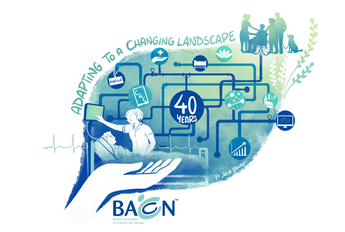Obituary Mr Philip Woodrow
29th Jul 2020
It is with sad news that we at the British Association Critical Care Nurses inform you that Mr Philip Woodrow died suddenly on the 25th July 2020.
Our thoughts and condolences go to Philips family, friends and colleagues.
Philip was a true leader within critical care nursing and his significant contribution to nursing over his remarkable career is truly commendable. His career has been varied, working in a variety of clinical, academic, education and practice development roles. He was a prolific writer, publishing many peer reviewed articles as well as his famous book ranges which are highly regarded as essential reading for any critical & acute care nurse. His renowned book “Intensive Care Nursing: A Framework for Practice” had reached its 4th Edition in 2018 from its original 1st Edition co-author publication with Jane Roe back in 2000. For the book to achieve its 4th publication edition, is testimony that the book is an essential resource for all new and experienced nurses working within critical care. Many critical care nurses have used Philips book to learn and consolidate new theory whilst growing their career within Intensive Care. There are not many critical care nurses that do not own or who have not referenced Philip in their studies at some point during their career. This is testimony to Philip’s exceptional writing style where he had the unique skill of breaking down complex theory into a concise and understandable style that the reader could comprehend. His books were an essential resource for any new starter to critical care as well as those undertaking their academic critical care course and are a trusted companion for many staff working in critical care.
In addition to the celebrated “Intensive care Nursing” publication, he was also passionate about developing and supporting ward nurses acute and critical care knowledge and skills. This was evident with his book publications of “High Dependency Nursing Care” and “Nursing the Acutely Ill Adult”. Philip had a passion and enthusiasm to develop ward nurses’ knowledge and skills with nursing the acutely ill patient and was always striving to implement current evidence based practice. As well as his extensive publication profile on ward based acute care, he also devised a number of pioneering courses aimed specifically at developing nurses and AHPs skills and knowledge within high dependency care. For a number of years, Philip had been working as a Critical Care Practice Development Nurse at East Kent Hospitals University NHS Foundation Trust, where hundreds of nurses have benefited from attending this course which has been hugely impactful for patient outcomes. Everyone who knew Philip could see his commitment and dedication to empowering nurses with the skills to care for acutely ill patients whether that was through his education or his scholarly activities. Philip was always a strong advocate for providing high quality education and would always have the patient at the centre of his teaching or publication. He was a great believer that educators must remain clinically credible with what they were teaching and he frequently worked hands on with patients within critical care to maintain his authenticity within clinical practice.
Philip has made a considerable contribution to critical care at a national and international level. He was a frequent plenary and concurrent presenter at the BACCN annual conference. He also supported education activity at several regional BACCN events and was always keen to support and develop fellow nurses regardless of their level of experience. He also had been a long-standing supporter of Nursing in Critical Care journal both being a peer reviewer for the journal and an accomplished author. He would mentor new reviewers to the journal by providing his wisdom and experience to develop new peer reviewers to enable them to progress in the role. Philip frequently published clinical topics within Nursing Standard. These topics focused upon foundation skills within acute care relating to ECG, Arterial blood Gases, Non-Invasive Ventilation and many more. His unique and uncomplicated writing style enabled nurses to interpret and understand clinical procedures which were impactful on the readers learning and their clinical practice. In addition to critical care he also had an interest with elderly care and ageing which was also reflected in his book publication and journal papers. He had undertaken an extremely well evaluated key note plenary session at a BACCN congress analysing the impact of Ageism in critical care and its learning for nursing focusing on the psychological and physiological impact for care.
Philip was a kind, gentle and generous man who was highly regarded by those who worked with him and those who were educated by him. As well as being a devoted nurse, educator and family man, he enjoyed his literature and poetry. He had an academic qualification in literature and was part of a local poetry group and enjoyed reading retreats. This joy of literature certainly informed his publications, as his creative writing style was always informative, clear and concise.
There is no doubt, that Philip was one of the most prolific publishers within critical care and there are not many nurses who have not read one of his publications and have then applied that learned theory to the bedside. Philip’s legacy is that thousands of patients and their relatives have directly benefitted from nurses’ knowledge and skills that they have learned directly from Philips books, journal papers, presentations and education. We as a profession are indebted to Philips dedication, altruism and enthusiasm to promote the art and science of critical care nursing. Philip is regarded as one of the Critical Care Greats. His impact on critical care nursing will live on through all the nurses he has inspired and empowered to provide evidence-based nursing care.
Our condolences go to Philips family.
Rest in Peace Philip
Dr Tim Collins Catherine Plowright
Past Professional Advisor Professional Advisor





